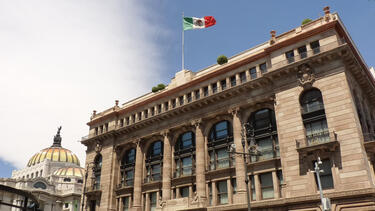How is Mexico Navigating the COVID Financial Crisis?
In a recent online conversation hosted by Yale SOM, Mexico’s chief central banker discussed the country’s response to the economic distress caused by COVID-19—the country’s third financial crisis in recent decades. He said that Mexico’s response was designed to preserve the hard-won gains its banking sector and economy have made since the 1990s.

The Banco de México in Mexico City.
Like every other country, Mexico has been shaken by the economic effects of the COVID-19 pandemic. But the crises that Mexico has endured since the 1990s have left the country in a stronger position to withstand the latest economic shocks, Banco de México governor Alejandro Díaz de León ’95 told Professor Andrew Metrick in a live online discussion on November 20.
“The banking system and the financial system in general are in a relatively strong position. This has been the result of over two decades of dealing with a very painful and costly financial crisis.”
After the peso crisis of 1994, which led to the internationalization of Mexico’s banks, and the global financial crisis of 2008-09, Díaz de León said, “the banking system and the financial system in general [are] in a relatively strong position, in terms of capital base, in terms of liquidity, and in terms of management and corporate governance… This has been the result of over two decades of dealing with a very painful and costly financial crisis.”
Díaz de León spoke with Metrick, the Janet L. Yellen Professor of Finance and Management and the director of the Yale Program on Financial Stability, in a Yale SOM Exchange event titled “Financial Stability in the COVID Era.”
In some respects, Díaz de León said, the response to COVID in emerging economies like Mexico has been similar to that of more advanced economies. “What we saw was a very sharp risk aversion dynamic, a dash for cash, everywhere, in advanced and in emerging [economies],” he said, “Central banks in different places put different measures in trying to foster liquidity, and trying to avoid bottlenecks in the financial credit challenge.”
The differences among developing and advanced economies are more evident when it comes to their fiscal response to the COVID recession, he noted. “Clearly. advanced economies have more room to maneuver in terms of public sector debt… Countries with very low debt-to-GDP levels have been able to spend in an aggressive way to try to foster and to support aggregate demand.”
The openness of Mexico’s economy and the importance of foreign investment there means that it must be particularly cautious in spending, Díaz de León added. “We need to remain an attractive place for investment on a permanent basis. So that means you need to be extra prudent on a strong macro stance and using the policy space available judiciously and not carelessly.”
Díaz de León answered a series of questions from the audience, including one about the role of fintech in increasing financial inclusion in Mexico. Noting that Mexico’s banking sector consolidated in the wake of the peso crisis and remains concentrated, he said, “I do hope that the new fintech dimensions can add an additional layer of competition. At the central bank, we are quite eager to see how fintech can really translate into better services and lower costs to a larger part of the population.”
Answering a follow-up question, he expressed skepticism that digital currencies like Bitcoin offered a solution. “Are we aiming at the best social outcome, nationally and globally, or are we aiming at just circumventing the current status quo and the central bank mandate?” he asked. “I think it is in the best interests of society to have a new equilibrium, where you can have digital payments done in a very agile way, not only domestically but cross border… I do believe that the issue is not really the currency but the network.”
Watch the discussion: